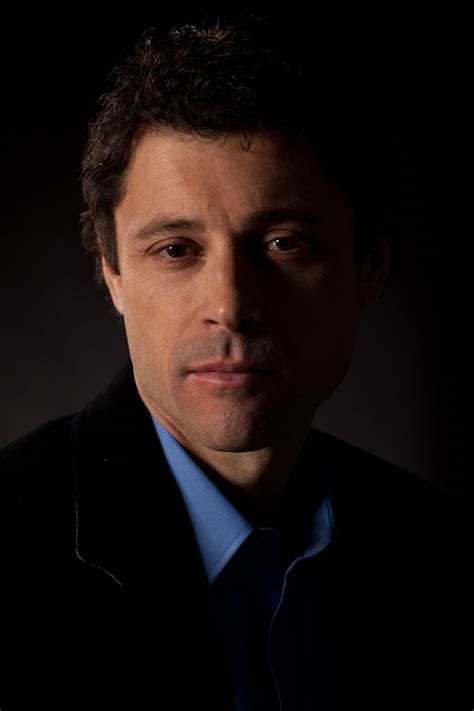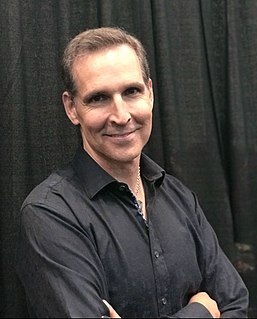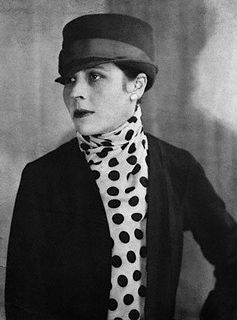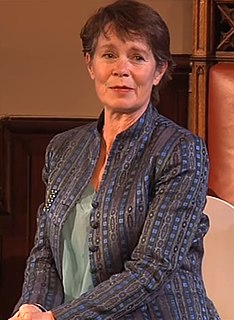A Quote by Elliot Perlman
Listen- all that she was then, all that she is now, those gestures, everything I remember but won't or can't articulate anymore, the perfect words that are somehow made imperfect when used to describe her and all that should remain unsaid about her- it is all unsupported by reason. I know that. But that enigmatic calm that attaches itself to people in the presence of reason- it's something from which I haven't been able to take comfort, not reliably, not since her.
Related Quotes
You must learn her. You must know the reason why she is silent. You must trace her weakest spots. You must write to her. You must remind her that you are there. You must know how long it takes for her to give up. You must be there to hold her when she is about to. You must love her because many have tried and failed. And she wants to know that she is worthy to be loved, that she is worthy to be kept. And, this is how you keep her.
Occasionally, on screen, Barbara [Stanwyck] had a wary, watchful quality about her that I've noticed in other people who had bad childhoods; they tend to keep an eye on life because they don't think it can be trusted. After her mother was killed by a streetcar, she had been raised in Brooklyn by her sisters, and from things she said, I believe she had been abused as a child. She had lived an entirely different life than mine, that's for sure, which is one reason I found her so fascinating. I think her early life was one reason she had such authenticity as an actress, and as a person.
Mother is in herself a concrete denial of the idea of sexual pleasure since her sexuality has been placed at the service of reproductive function alone. She is the perpetually violated passive principle; her autonomy has been sufficiently eroded by the presence within her of the embryo she brought to term. Her unthinking ability to reproduce, which is her pride, is, since it is beyond choice, not a specific virtue of her own.
Once again your mind explodes with a searing pain. A floodgate of memories bursts wide. Yet it is her face that keeps haunting you. Always her face. Who is she? Then things begin to crystallize. You remember your funeral. Begging and pleading for someone to release you from the darkness. You're not dead. You can't be. Then you feel her presence. Warm, caring, soothing. But somewhere deep inside she feels empty now. She has no reason. No meaning. No soul. But your soul lives. While her's is dying.
Now very much against her will, she thought of the way Jace had looked at her then, the blaze of faith in his eyes, his belief in her. He had always thought she was strong. He had showed it in everything he did, in every look and every touch. Simon had faith in her too, yet when he'd held her, it had been as if she were something fragile, something made of delicate glass. But Jace had held her with all the strength he had, never wondering if she could take it--he'd known she was as strong has he was.
Her [Eleanor Roosevelt] father was the love of her life. Her father always made her feel wanted, made her feel loved, where her mother made her feel, you know, unloved, judged harshly, never up to par. And she was her father's favorite, and her mother's unfavorite. So her father was the man that she went to for comfort in her imaginings.
She was nervous about the future; it made her indelicate. She was one of the most unimportantly wicked women of her time --because she could not let her time alone, and yet could never be a part of it. She wanted to be the reason for everything and so was the cause of nothing. She had the fluency of tongue and action meted out by divine providence to those who cannot think for themselves. She was the master of the over-sweet phrase, the over-tight embrace.
She was beautiful, but not like those girls in the magazines. She was beautiful, for the way she thought. She was beautiful, for the sparkle in her eyes when she talked about something she loved. She was beautiful, for her ability to make other people smile, even if she was sad. No, she wasn't beautiful for something as temporary as her looks. She was beautiful, deep down to her soul. She is beautiful.
She sat leaning back in her chair, looking ahead, knowing that he was as aware of her as she was of him. She found pleasure in the special self-consciousness it gave her. When she crossed her legs, when she leaned on her arm against the window sill, when she brushed her hair off her forehead - every movement of her body was underscored by a feeling the unadmitted words for which were: Is he seeing it?
Before her marriage she had thought that she had love within her grasp; but since the happiness which she had expected this love to bring her hadn’t come, she supposed she must have been mistaken. And Emma tried to imagine just what was meant, in life, by the words “bliss,” “passion,” and “rapture” - words that had seemed so beautiful to her in books.
She emptied herself of Fabio and of herself, of all the useless efforts she had made to get where she was and find nothing there. With detached curiosity she observed the rebirth of her weaknesses, her obsessions. This time she would let them decide, since she hadn't been able to do anything anyway. Against certain parts of yourself you remain powerless, she said to herself, as she regressed pleasurably to the time when she was a girl.
If I look back, my mother was always out. I can remember the perfume and her scarlet chiffon dress and crystal beads, going to a party. She used to play her violin at restaurants later on in life and at old people's homes. She loved the races, which she used to take me to as a child: our carpets were bought with her winnings. Loved her chickens.
I was bullied by my siblings and cousins, so make-believe was a way in which I could be in charge. When I was like 10 and my sister was about five, I convinced her that she was going to jail because she used a bad word. The doorbell happened to ring, and I told her it was the police. I made her pack her bags. She was crying, and then I said to her, "I forgive you, and I'm gonna tell the cop to go away." Then, of course, she loved me. It was terrible - she still remembers it. I had a sordid sense of humor.
As he was about to leave, she said, "Murtagh." He paused and turned to regard her. She hesitated for a moment, then mustered her courage and said, "Why?" She though he understood her meaning: Why her? Why save her, and now why try to rescue her? She had guessed at the answer, but she wanted to hear him say it. He stared at her for the longest while, and then, in a low, hard voice, he said, "You know why.


































